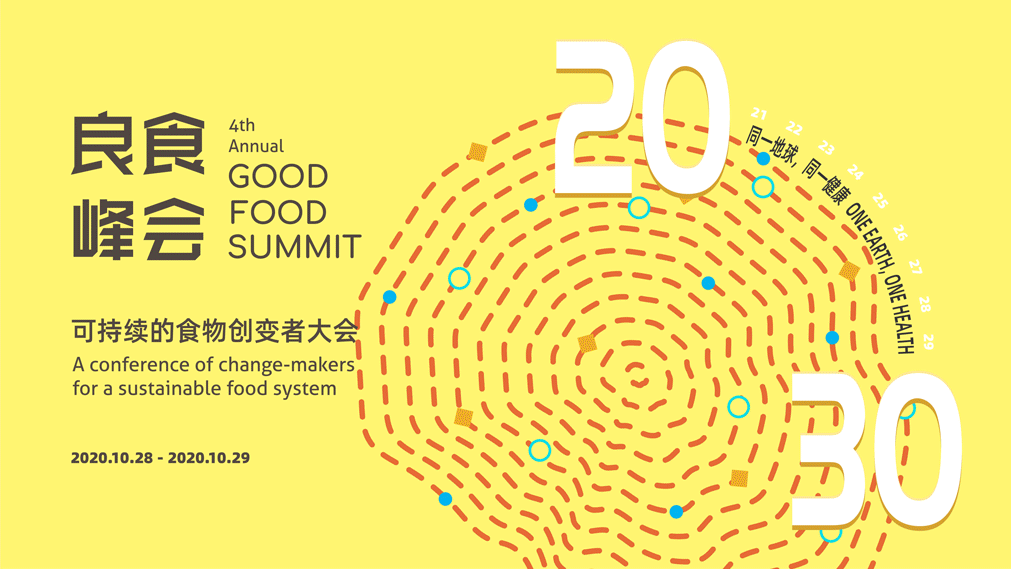
On October 28 and 29, 2020, the 4th annual Good Food Summit, initiated by the Good Food Fund at the China Biodiversity Conservation and Green Development Foundation (CBCGDF), was successfully held online.
The Summit received great support from experts and scholars around the world, partners in the industries, higher education institutions, and young activists. By the time the Summit ended at 17:30, October 29, the five live broadcasts of the Summit have reached a total of around 345 thousand views through the Baidu live-stream service, and were on the list for the top 10 livestreams with the most hits within an hour for multiple times.
While the Summit contained a lot of professional content, there still were a lot of audiences that were interested in the transformation of the food system, which indicates that the public is now paying more attention to food topics after the pandemic.

Mr. Zier WANG, a 2020 Good Food Fellow and well-known show host, emceed the Summit. He started off with the topic of the Summit: the focus on the transformation to a sustainable food system, and global collaboration for a better future. He also thanked everyone who participated in and supported a healthy and sustainable food system.
Dr. Jinfeng ZHOU, the Secretary-General of the China Biodiversity Conservation and Green Development Foundation, delivered the opening speech. Dr. Zhou pointed out that, currently, in the face of three crises – the biodiversity crisis, the climate crisis, and the public health crisis during a time of unprecedented changes, we need to come together to serve for, what President Xi Jinping calls for, “the Community with Shared Future for Mankind” and the community with shared public security and health, promote food system transformation advocated by the Good Food Fund, and jointly create a new era of the development of the ecological civilization.
Ms. Ling QIAO, the Chairwoman of Slow Food Great China, also delivered a welcome speech for the Summit. Ms. Qiao said, Slow Food and Good Food have a lot of ideas in common. The Good Food Fund and Slow Food International have had a lot of discussions for collaborations. In recent years, Slow Food Great China and the Good Food Fund have started frequent conversations and initiated multilateral cooperation, such as the recent collaboration on the Good Food Handbook for a WET Market Revolution and the transformation of wet markets under the WET market principles.
Besides, Ms. Qiao expressed her expectations and wishes for the theme of the Summit: the 2030 Goal. Ms. Qiao said: “The road for the Good Food has just begun. It carries great social responsibilities and has a long way to go. We are willing to work together with the Good Food Fund, and strive to achieve the goals.”
Mr. Zhenyao WANG, Founding President of the renowned China Philanthropy Institute, delivered a speech about how Good Food is a great act for passing on and integrating the cultures around the world. He also believes that Good Food is an important medium of civilization, and since the Chinese culture advocates for the homology of medicine and food, the improvement of our eating habits is in fact facilitating cultural exchanges.
Wang hopes that through the cooperation of the Good Food Fund and the international community in the future, food transformation as such can be turned into a worldwide movement. In addition, it goes well with the charity events in China, since such food transformation itself is an act of good will.
Following the wonderful speeches is the introduction to the agenda of the Summit, delivered by Mr. JIAN Yi, Founder and President of the Good Food Fund. Mr. Yihong Li, the Executive Director of Edible China - the Biodiverse Food Project under the China Biodiversity Conservation and Green Development Foundation, introduced their ongoing events promoting biodiversity plant-based food.
Mr. Huiyu OUYANG, the Food Policy Officer of the Good Food Fund, launched the “WET market” project.
Afterward, Ms. Sara Farley and Ms. Deepali Khanna from The Rockefeller Foundation introduced the 2050 Food System Vision Prize. Through its hard work in the course of six months, the Good Food Fund's Mama’s Kitchen project stood out from over 1000 teams around the globe and become one of the top 10 finalists of the prize. The 2050 Food System Vision Prize is aimed at inspiring creative transformation in the global food system, promote the integration of resources and information, establish an international network, and create strong connections.
Keywords: Asian Health Research, Food Policy, Chefs’ Leadership
In his opening speech, Mr. Victor KOO, board member of the Good Food Fund and Chairman of Heyi, shared his team’s research results on Asian health and dietary patterns. Mr. Koo mentioned that during the COVID-19 pandemic, patients with chronic medical conditions are more vulnerable to the coronavirus. At the same time, chronic diseases like cardiovascular diseases, cancer, and chronic respiratory diseases are among the top five causes of death in China, which is highly similar to that of the United States. In the past ten years or so, dietary patterns of the Chinese have become more and more westernized: the ratio of vegetables and fruits was decreasing year by year. A huge burden was imposed on the health of the environment, animals, and human beings through things like greenhouse gas emissions, deforestation, and environmental pollution.
As 60% of the world’s population is in Asia, if Asians keep on following the dietary patterns of the Westerners in the 20th century, i.e., making meat the main thing on the dinner table, which in turn leads to intensive animal farming, the planet will be overwhelmed.
Thus, our dietary patterns need to transform towards the direction of what the Good Food Pledge suggests and we should reduce the consumption of animal-source foods. Our dietary patterns have a profound impact on the health of animals, human beings, and the planet.
Since food system transformation requires integrated efforts through the value chain, platforms like the Good Food Summit is essential in terms of connecting all the stakeholders and making consolidated efforts.
Dr. Shenggen FAN, former Director of the DC-based International Food Policy Research Institute and the Chief Academic Advisor of the 4th Good Foot Summit, delivered a keynote speech on the topic of “Food Policy and Sustainable Food System”.
Dr. Fan reviewed the great challenges posed by the COVID-19 pandemic. The world needs a more resilient and more tolerant food system – one in which everyone and every part of the food system is being taken good care of, which ensures access to healthy food for everyone including low-income people, livelihood for small-scale producers can receive. The future food system should make sure that the food that is being wasted right now can be given to those who need it, and that wild animal won't lose their habitats due to the expansion of agricultural land. Such systematic transformation is inseparable from the macro control of food policy.
Dr. Fan also mentioned that he and his fellow researchers will utilize data and researches to support the formation of food policy, in order to achieve the goals of having a productive, low-carbon, nutritious, resilient, sustainable, and inclusive food system.
Greg Drescher, Vice President of the Culinary Institute of America (CIA), talked about a collaboration between the CIA and scores of other higher education institutions such as Harvard University, Stanford University, Massachusetts Institute of Technology, and Yale University. The collaborative focuses on college food services so they can develop healthy menus based on evidence-based science. It also promotes “Menus of Change” across the U.S., which encourages chefs to learn from food cultures from around the world, and create new dishes that are primarily based on plant-based ingredients.
In addition, Drescher adjusted the course curriculum, and initiated the annual Global Plant-Forward Culinary Summit, an online platform called Plant-Forward Kitchen, and the CIA Plant-Forward Culinary Art Education. Currently, CIA is collaborating with Google, designing curriculum for chefs and culinary school teachers around the world.
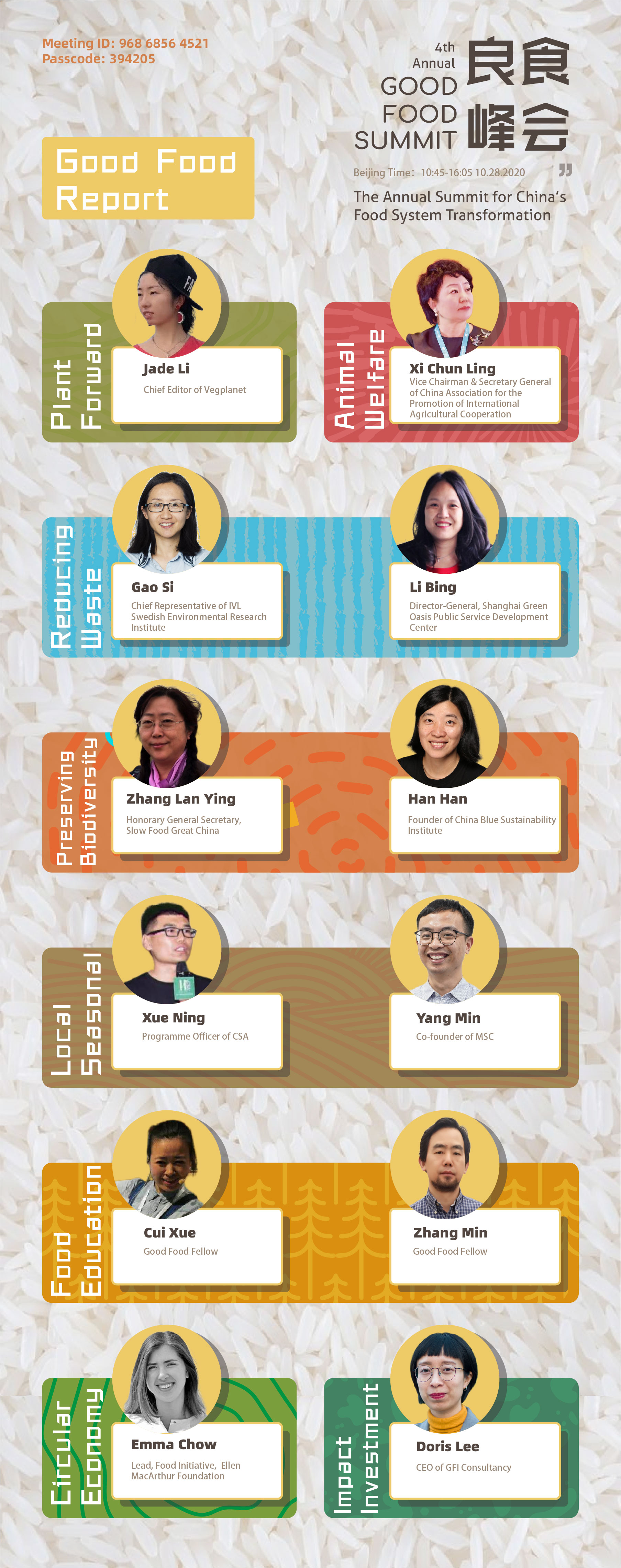
Following the keynote speeches is the first major section of the Summit – experience sharing of The Good Food Report. This is the first edition of the annual Good Food Report. We collected best practices of the previous year from 28 institutions, both domestic and foreign, on the eight principles advocated by the Good Food Fund.
During the Summit, we invited eight representatives from institutions who contributed to the Report.
Ms. Qingyao LI, Chief Editor of VegPlanet, shared the innovative explorations VegPlanet has made in advocating for an environmental friendly and vegetarian lifestyle.
Ms. Chunling XI, founding President of the International Cooperation Committee of Animal Welfare (ICCAW), talked about what ICCAW has done to promote animal welfare in China in recent years.
Ms. Si GAO, China Country Director of the Swedish Environmental Research Institute (IVL) focused on the topic of waste reduction, and talked about how IVL cooperated with different stakeholders and raised industry as well as public awareness through providing international resource support, carrying out case studies, formulating standards and specifications, supporting exemplary projects, and showing and promoting the best practices, etc.
Ms. Bing Li, Chairwoman of Shanghai Green Oasis Public Service Development Center also talked about waste reduction. Li explained how she founded Oasis Green Food Bank in 2015, then the only food bank project in China, and how it later joined the global food bank network in 2017. Food banks aim at connecting wasted food with those in need, and thus reduce waste while alleviating hunger problems.
Ms. Lanying ZHANG, the Honorary Secretary of Slow Food Great China, and Ms. Han HAN, founder of China Blue Sustainability Institute, shared their practices, respectively, under the topic of biodiversity. Through Ark of Taste and Slow Food Presidia, Slow Food protected over 5,000 local foods that are near extinction. As the first NGO in China that focuses on the sustainability of the fishery, the China Blue Sustainability Institute promotes the systematic transformation of fishery through interdisciplinary research and public campaigns.
Mr. Ning XUE, Officer with the CSA (Community-Supported Agriculture) Alliance, and Mr. Ming YANG, co-founder of MSC (Maker Sustainability Consulting) and founder of Xiangxing Group (Xiangxing has the connotation of revitalizing the rural areas), focused on the topic of buying local and seasonal, and shared the PGS inspection system of the Beijing Luze Group and the think tank services brought by Xiangxing Group to the Chinese villages, respectively.
Two 2020 Good Food Fellows, Ms. Xue CUI, founder of “Yummy”, and Mr. Min ZHANG, General Manager of Nanjing Puyu Ecological Technology Co., Ltd, shared their explorations in the field of food education. Ms. Doris LI, General Manager of GFI Consultancy (GFIC), focused on the topic of impact investing and shared GFIC’s interpretation of the development trend in the alternative protein industry.
Ms. Emma Chow, who oversees the Circular Economy project at the Ellen MacArthur Foundation, talked about the three elements of circular economy: using regenerative agriculture for production, reinforcing local connections, and making the most of the food.
In the second part of the Summit, Mr. Yi JIAN, Founder and President of the Good Food Fund, launched the “2030 Pledge”, which calls for by the year 2030 an increase of high quality, biodiversity plant-based food by 30% to take the place of the 30% animal source food that we are currently consuming.
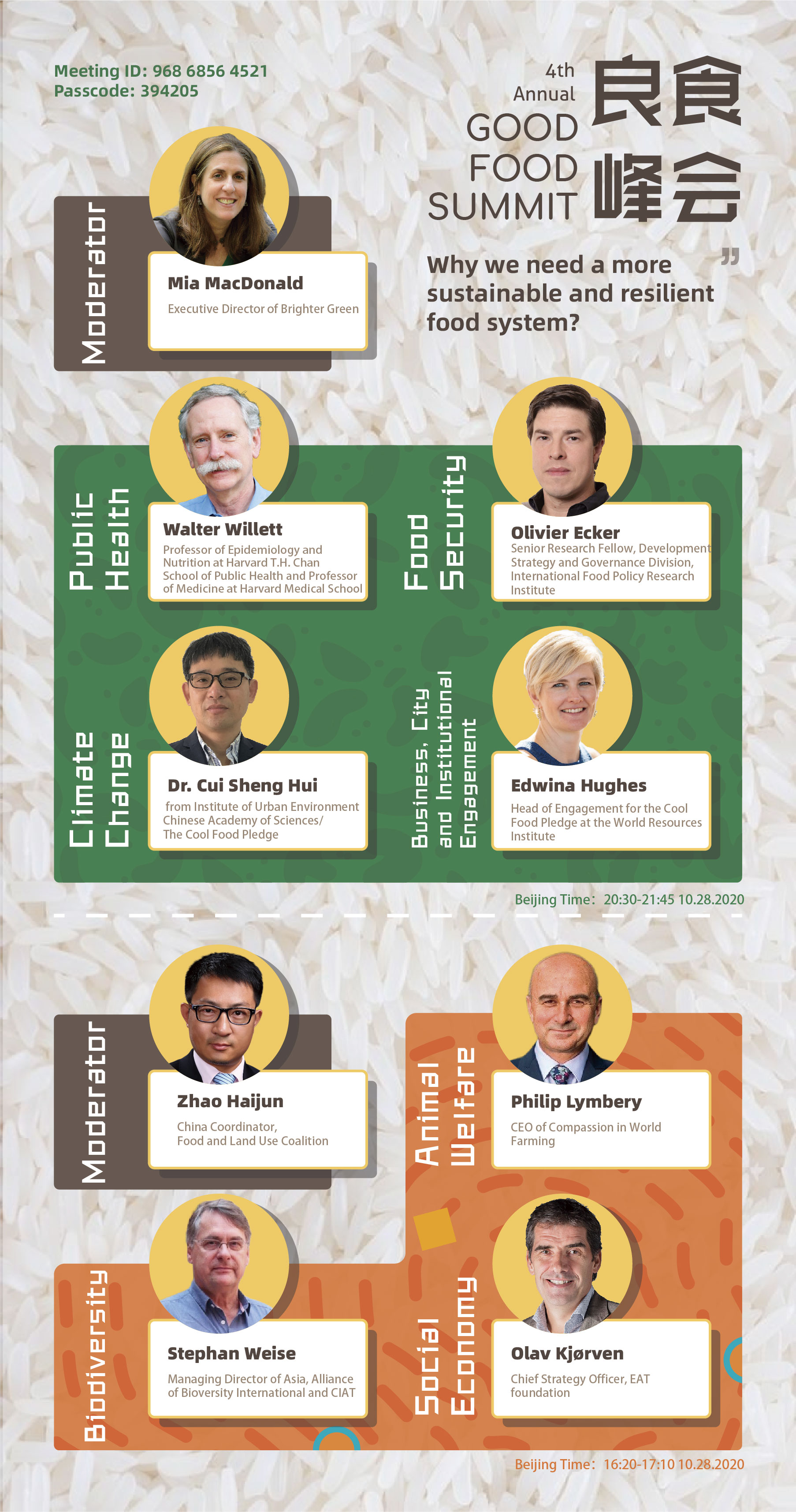
Keywords: Animal Welfare, Climate Change, Biodiversity, Social Economy, Public Health, Food Security, Business Cooperation
When we discuss the transformation of the food system into a more sustainable and resilient direction, we need to first understand why the current food system needs transformation. Moderated by Mr. Haijun ZHAO, the Coordinator of Food and Land Use Coalition in China, Mr. Philip Lymber, Chief Executive Officer of Compassion in World Farming (CIWF), Mr. Stephan Weise, Deputy Director-General of Bioversity International, and Mr. Olav Kjørven, Chief Strategy Officer at EAT Foundation, provided their insights.
Mr. Lymbery talked about the heavy burden brought to the global ecosystem by intensive animal farming, which also caused the increase in avian influenza virus, the decrease of natural habitats for wild animals, the tremendous waste of food resources (while there still are 800 million people around the world who suffer from hunger). Decreasing the consumption of animal products, as we proposed in the Good Food Pledge, and valuing the improvement of animals’ living conditions can effectively help to terminate the destructions brought by the industrialized food production system.
Mr. Weise approached the problem from the perspective of the environment and biodiversity. He shared the fact that there are only fewer than 200 types of food in the food supply chain around the world, with 9 types of vegetables or animals that accounts for 70% of the global food production. From this angle, the biodiversity of our food is very low. At the same time, three major crops – rice, wheat, and corn – account for 50% of the plant-based calorie consumption. In fact, agriculture, nutrition and environment intertwine with each other, and we cannot look at them or solve the problems separately. Introducing biodiverse ingredients into the current food system will allow us to improve the diversity of nutritional intake as well as the diversity of our ecosystem.
Mr. Olav Kjørven shared the insights of the EAT Foundation on the current food system and talked about the specific short-term goals for the transition of food system transformation. The EAT Foundation hopes to explore the elements that hinder the food system transformation and how to cope with these problems while meeting the needs of different countries by designing policies case-by-case.
Mia MacDonald, Executive Director of Brighter Green moderated the (China time) evening session of Oct. 28. Dr. Shenghui CUI, a research fellow with the Institute of Urban Environment at the Chinese Academy of Sciences, Mr. Olivier Ecker, Senior Researcher at the Development Strategy and Governance Department of the International Food Policy Institute, Edwina Hughes, who is in charge of the Cool Food Pledge project of the World Resources Institute, and Dr. Walter Willett, Professor of Epidemiology and Nutrition at the Harvard T.H. Chan School of Public Health, delivered keynote speeches from their respective angles - public health, climate change, food security, etc.
Dr. Willett talked about the scientific research methods and research topics that can be used in the field of a healthy diet, for instance, the relationship between chronic diseases and protein sources, and the conclusions from such topics.
Dr. Cui introduced the calculation of the agricultural carbon footprints. He also illustrated the curve of carbon footprint and obesity risks under the carbon footprint of food mentioned in the Chinese Dietary Guidelines and different dietary patterns.
Mr. Ecker talked about the new challenges of food security, the important role of food policies, and the key research topics in the field of food policy.
Ms. Hughes shared her thoughts on how the Cool Food Pledge helps restaurants fulfill the needs of their customers while reducing the environmental effects of food.
Round Tables
Key Words: Vegan Advocacy, Youth Activism, Food Policy, Corporate Food Service, Animal Welfare, Chefs’ Leadership
Having discussed the “why” of food system transformation, we moved forward to the third part of the Summit: Round Table, which would explain the “how”.
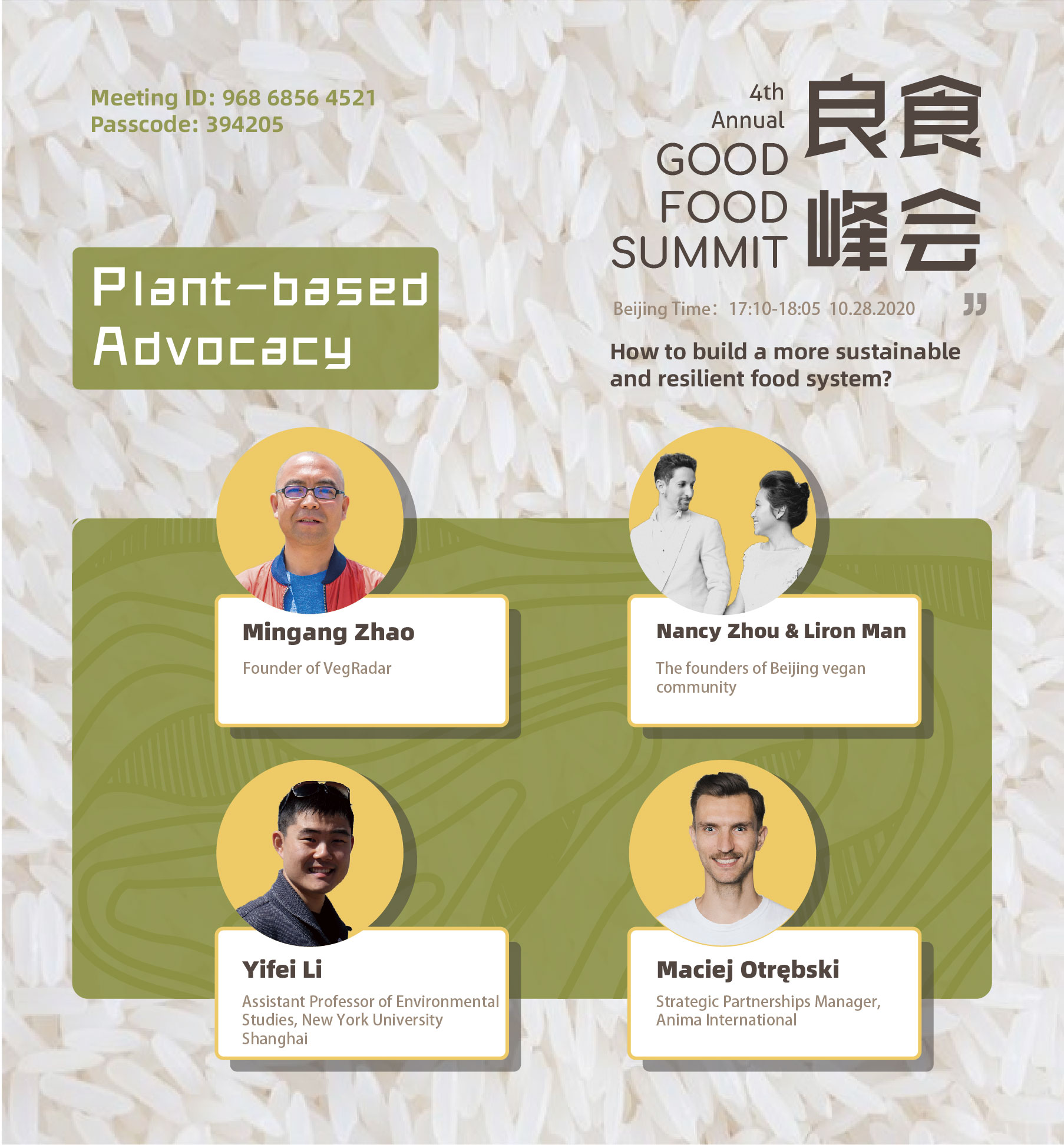
The first roundtable was moderated by Ms. Cecilia ZHOU, the Chief Project Officer of the Good Food Fund, and four groups of speakers expressed their opinions on vegan advocacy.
Mr. Mingang ZHAO talked about how VegeRadar compiled an atlas for vegetarian restaurants across China.
Nancy and Liron Man, a vegan couple, introduced how the Beijing Vegan Community they founded helps create a community based on vegan and green lifestyle, and how it helps people to cope with the struggling period of diet transformation.
Maciej from Poland introduced how Anima International turns plant-based diet into the mainstream and how to cooperate with potential stakeholders.
When asked about how to improve the effectiveness of vegan advocacy, Mingang ZHAO from VegeRadar thinks that it is important to make vegan diets an easier choice. For instance, APPs and WeChat mini-programs can increase the interactions between consumers and restaurants. ZHAO also shared his experience in conducting training online.
Mr. Yifei LI believes that the positive effects of vegetarianism on the environment should be presented more to the public. Nancy believes that different groups of the public should be able to gain more experience from activities and learn about the actual practice of plant-based cooking. Maciej believes that we can offer a short-term vegetarian experience to the public, such as adopting a vegan diet three days a week.
According to Maciej, it is easier to transform eating habits if such transformation is done three times a week than once a week.
Today, the unsustainable food production process and consumption pattern are the important factors that lead to public health crises and environmental crises. If we don’t take bold actions immediately, our future generations will be inheriting a severely degraded earth. More and more young people are taking action on food system transformation.
In “The Youth on the Move” Forum, 7 young people, coming from a diverse range of backgrounds, learning about the food topics from different angles and actively participated in social activism.
Kirby YANG, an animal welfare major who went abroad for college, reflected on changing the current situation in China after probing into the experiences from other countries. Chenying LIU, who studies law, set animal protection law and sustainable development as the direction for further studies. Xiaojuan TANG and Nicolas Feil go to Tongji University and London School of Economics and Political Science, respectively, and they push for the increase of plant-based food in the dining halls in their own ways. In addition, they actively communicate and share their experiences with their peers in college.
The participants all agree that the young generation needs more opportunities like the Good Food Summit to talk to one another, create networks and strengthen the participation and contribution of young people in the transformation of the food system.
Above is the information for Day 1 of the Summit.
Below are the links for the playback. You can copy and paste the link into your browser to watch the videos:
#morning
http://mbd.baidu.com/webpage?type=live&action=liveshow&room_id=3990165121
#afternoon
http://mbd.baidu.com/webpage?type=live&action=liveshow&room_id=3993405553
#evening
http://mbd.baidu.com/webpage?type=live&action=liveshow&room_id=3990221281
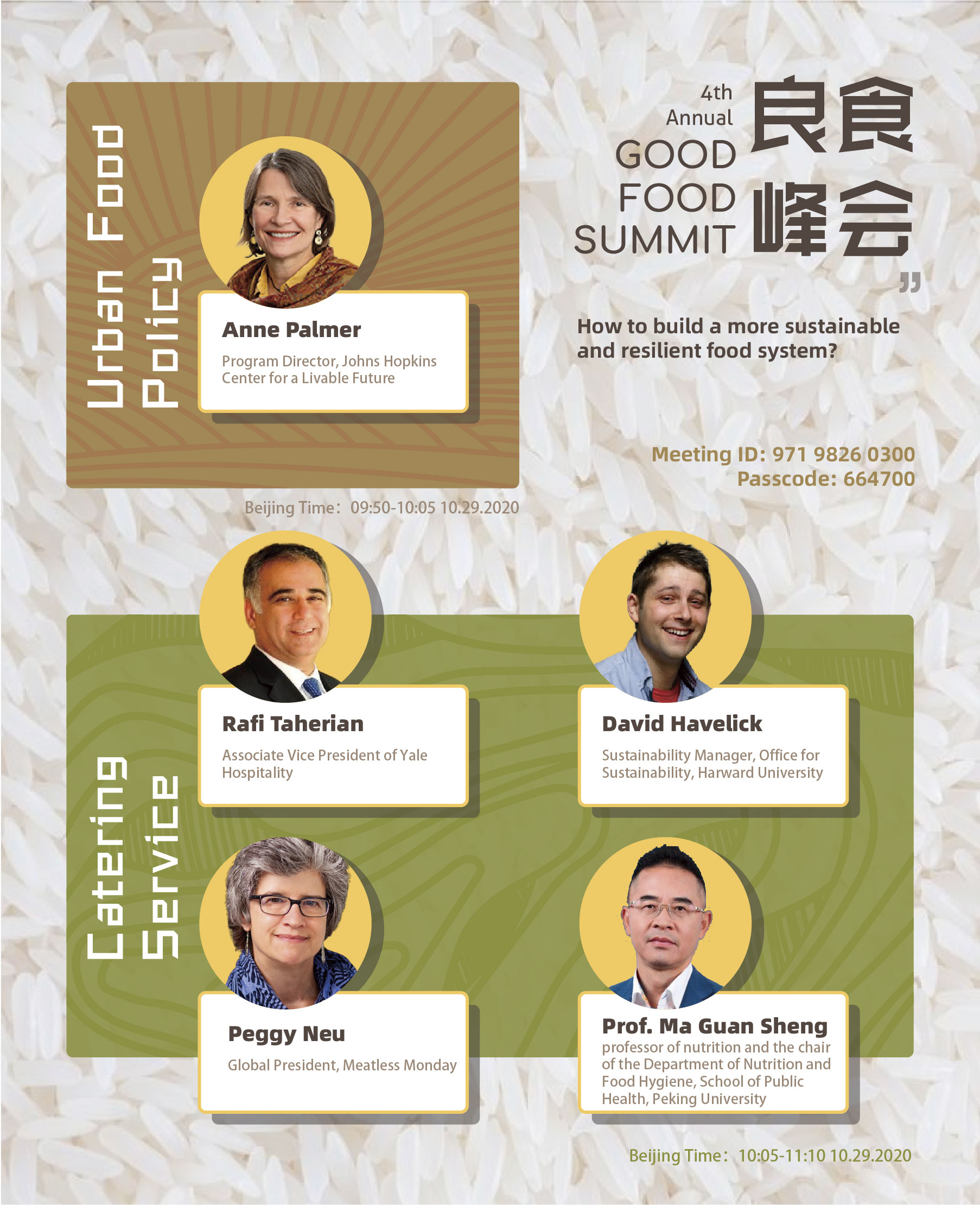
Yi JIAN, Founder and President of the Good Food Fund, opened the 2nd day of the Summit with a presentation of the “2030 Pledge”, before giving a short summary of Day 1.
Then comes the Corporate Food Service Roundtable, moderated by Ms. Weili WENG, Research Director of the Good Food Fund. During the Forum, Rafi Taherian, Associate Vice President of Yale Hospitality and David Havelick, manager at the Sustainability Office of Harvard University talked about how the institutions they are associated with promoting sustainable diet, and how to increase the public acceptance of “plant-forward” menus and reduce food wastes through creative designs. Ms. Peggy Neu, President of Meatless Mondays introduced the background of the Meatless Mondays project, shared their experience of working with hospitals, hospitality departments, and suppliers. She also talked about the relationship between food and environment with quantified data.
Dr. Guansheng MA, Chair of the Department of Nutrition and Food Hygiene at the School of Public Health of Peking University, shared the change of the relationship between the corn consumption level and the animal source products consumption level in China over the past ten years or so. He also referred to the WHO data to demonstrate the important impact of food on health: adjusting lifestyle can prevent 80% of the heart and cerebrovascular diseases and type II diabetes, 55% of hypertension, and 40% of tumors.
When asked about how the design of plant forward menus of corporate meals can impact the whole food industries, the guest speakers believe that, while promoting plant-based diet might cause aversion from traditional food industries, especially the meat industries, food companies have in fact noticed this wave of change, and are performing R&D on substitutions (e.g. alternative protein products) to adapt to the market trend. Therefore, the general demand of the consumers is a strong factor to push for changes in the food industry.
After the Corporate Food Service Roundtable, Anne Palmer, the Food Policy Council and Public Health program director at the Johns Hopkins Center for a Livable Future, talked about the actions taken by the Food Policy Council of the United States during the pandemic to ensure its domestic food supply, which shows us the active role played by the Food Policy Council in the American Food system and provided as a very valuable example for reference.
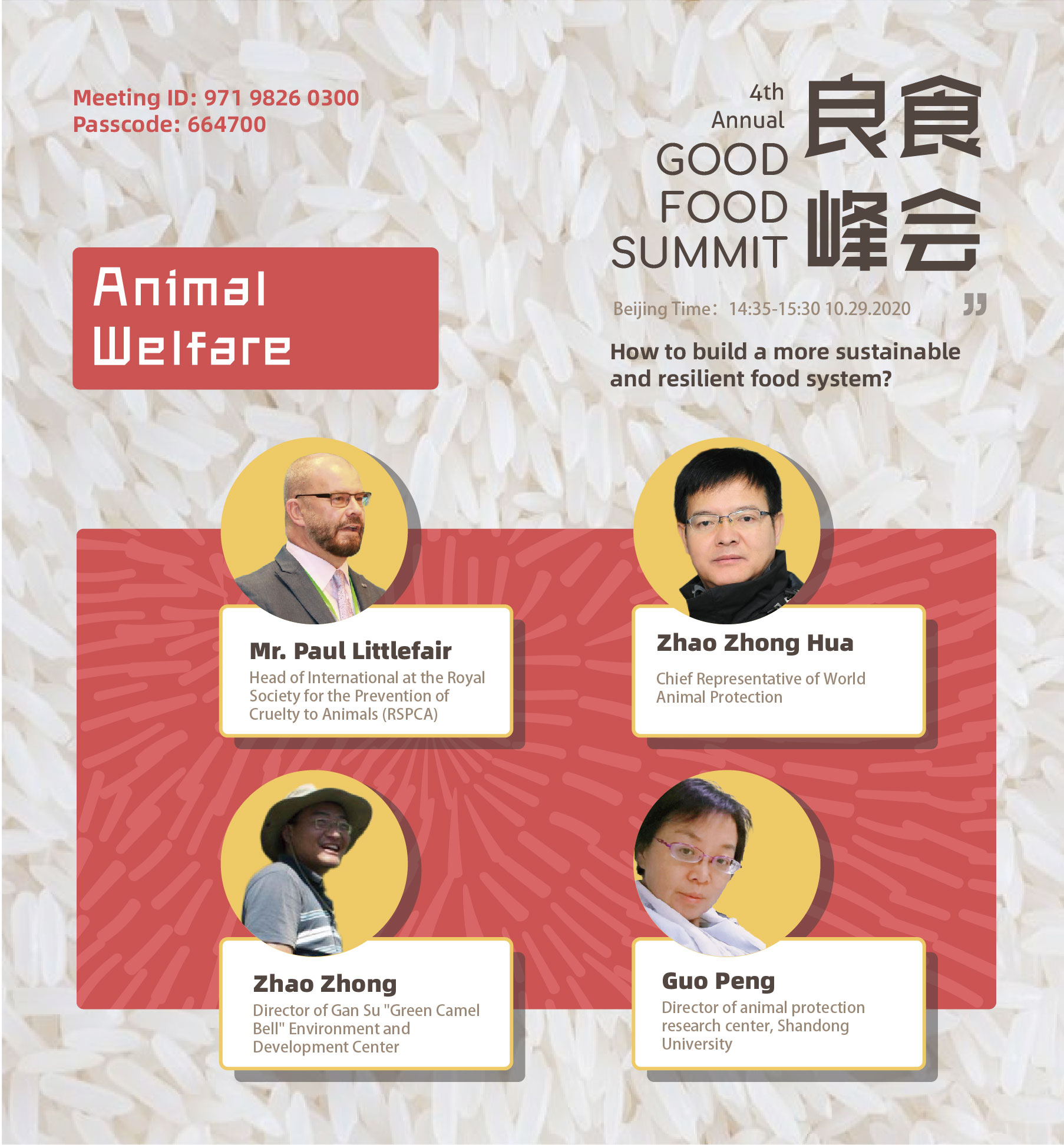
The Animal Welfare Forum was moderated by Ms. Melinda HOU, Executive Director of the Good Food Fund. Mr. Zhonghua ZHAO, China Country Director for the World Animal Protection clarified the relationship between several key concepts: animal welfare and vegetarian food, animal welfare and food security, etc. He also advocated for the idea of more vegetables and less meat.
Mr. Paul Littlefair, Director of International Affairs at the Royal Society for the Prevention of Cruelty to Animals (RSPCA) introduced the development of animal welfare in the United Kingdom. It’s highly possible for China to follow a similar path in the future. In addition, he also talked about how RSPCA promoted the welfare of farm animals, such as creating labels to help the consumers build their awareness of animal welfare.
Ms. Peng GUO, Associate Professor at the School of Philosophy and Social Development of Shandong University, dated back to the traditional Chinese dietary patterns, where even the wealthy families did not have a high meat intake. The current food system transformation we are advocating, to a large extent, is the comeback of the traditional Chinese culinary culture.
Mr. Zhong ZHAO, Director of Gansu Green Camel Bell Environment Development Center shared the collaboration between Green Camel Bell and the nomads in Northwest China. His talk illustrated that through restrained animal product consumption, high-level animal welfare breeding is completely possible in modern society.
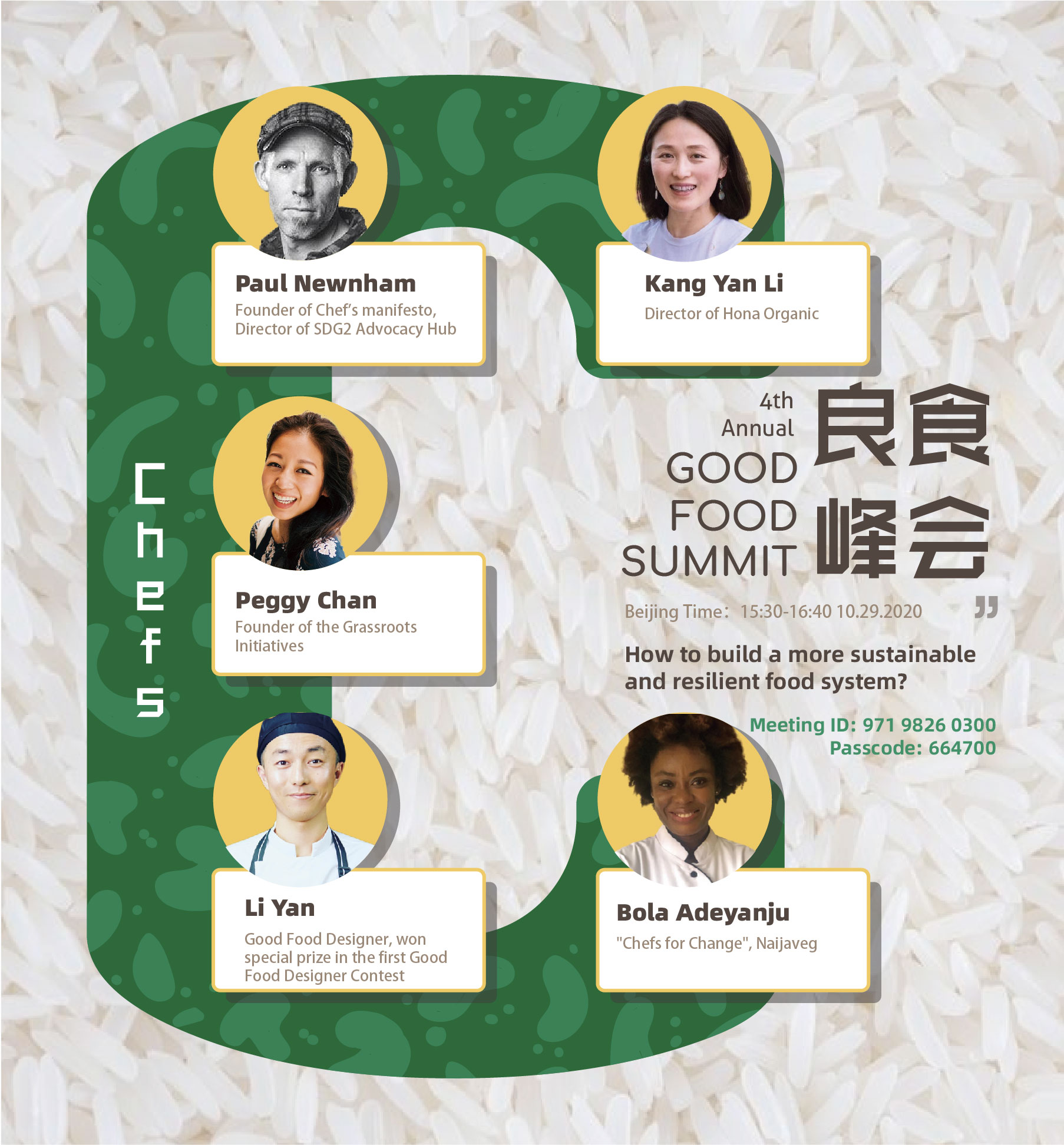
Chef's Forum is moderated by Ms. Cecilia ZHOU, the Chief Project Officer of the Good Food Fund. Mr. Paul Newnham, founder of the Chefs’ Manifesto talked about how the Chef's Manifesto connects to the UNSDGs. Ms. Yanli KANG, the Division Director at Hona Organic (China's leading organic condiment brand) introduced their brand story, recent collaborations with chefs, and called for more chefs to join the movement in the future.
Chef Lee, who won the 2020 Good Food Festival's national championship, shared the most recent updates of the Good Food's Mama's Kitchen, and expressed his expectations for the culinary industry to change in the future. Peggy Chan, founder of the Grassroots Pantry introduced the new practices done by her restaurant in the field of sustainable eating.
The Nigerian vegan Chef Bola Adeyanyu talked about the promotion of plant-sourced food in Nigeria and the food education projects they have done in rural areas.
In the Q&A session, our guest speakers shared their opinions on how chefs can make a difference. The speakers all agreed that training should be provided to more chefs, through which they can enhance their understanding on nutrition and the environmental impacts of food, update their recipes from the traditional ones, and find plant-based substitutes of meat.
According to Li, chefs need to attract public attention with great programs and projects and voice themselves as “eco-chefs”. Kang believes that eco-chefs need to be very well-rounded and need systematic support from the industry. In addition, cooperation among restaurants, farms, charity organizations, and research institutes is needed to develop a systematic manual. Newnham suggests utilizing the power of the platform to allow chefs to inspire and cooperate with each other.
In the end, Mr. Yi JIAN concluded the Summit, explained why the 2030 Pledge can be an important solution to the current global challenge we are currently facing. Next year, the 2030 Pledge will introduce a cooperation and reward system, and here we invite all the organizations and individuals to contribute to the cooperation framework of the 2030 Pledge.
We would greatly appreciate the insights shared by all speakers, which illustrated the key fact that food system transformation requires the cooperation of all stakeholders (e.g. producers, policymakers, food services, chefs, non-profit organizations, etc.). This is a systematic transformation in its true sense, as it starts from food, the most basic aspect of living, to rebuild a sustainable Earth for living.
In the end, we would like to thank everyone who has joined the fourth Good Food Summit, and thank all the staff members and volunteers who worked so hard to make the Summit a success. We would also like to thank Baidu Livestream for their support of the Summit. We will see you next year!
Playback Links for Day 2
#morning:
http://mbd.baidu.com/webpage?type=live&action=liveshow&room_id=3991679085
#afternoon:
http://mbd.baidu.com/webpage?type=live&action=liveshow&room_id=3994864612